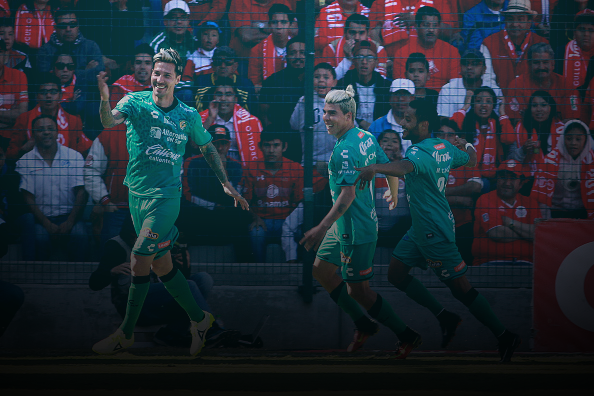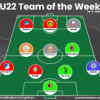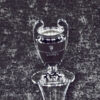Thomas Harrison writes about Chiapas and their incredible football under Sergio Bueno as they strive to stave off relegation.
Chiapas have delighted and entertained with their beautiful brand of football ever since Sergio Bueno took over last September. This Clausura (2nd half of the season) Bueno’s side have caught the eye of many, as his beautiful style has earned impressive victories over Mexican giants Tigres, Toluca, América and most recently Chivas.
Despite being part of the Liga MX relegation battle, Bueno has strictly stuck to his style of football. Bueno sends out as many attack-minded players as possible, usually fielding no defensive-midfielders, and attempts to break down teams through short passing moves. Here’s a breakdown of how Chiapas have created footballing art this season.

La Pausa
Perhaps the key to Chiapas’ beautiful football is their understanding of la pausa. Often cited as a major factor of the great Barcelona sides, la pausa (or the pause) is an interesting technical concept.
The concept seems simple at first, but can be extremely effective if conducted by intelligent players. The idea is to delay, or pause, a pass, rather than playing it straight away. This “pause” can lead to defenders being drawn into the ball, giving the player receiving possession more time and space to exploit.
On other occasions, players can delay a pass to wait for their teammate to get into a more effective position, or a position from which they can penetrate the opposition.
One example of Chiapas using this form of la pausa can been seen in the video below. When Marcelo Estigarribia gets the ball just outside the box, the expectation is that he’d attempt a cross or a shot on goal. Instead, he pauses, waits for the overlap from full-back Brayan Angulo, whose cross ends up going in via an opposition defender.
Then in Min 33, this Gabriel Achilier own goal brought Chiapas on level terms at 1-1. #LigaMXEng pic.twitter.com/bHcCaWIAcK
— Fut Mex Nation (@FutMexNation) February 13, 2017
La Pausa has helped Chiapas maintain possession in compact areas of the pitch, and penetrate opposition sides through their short passing moves. Multiple Chiapas players seem to understand the concept well, and are able to pick the right moments to pause, and the correct times to move the ball on quickly.
Movement
Brayan Angulo’s overlapping run is just one example of how Chiapas players move off the ball. In Los Jaguares’ adventurous and fluid style, there’s plenty of forward and diagonal runs, and clever movement off the ball to create space.
The best example comes from Luis Ángel “Quick” Mendoza’s goal against Tigres in January. Mendoza, who plays on the right-wing for Chiapas, is given the license to roam from his starting position. He makes the most of this freedom during the goal below, running diagonally across the Tigres defence to get in-behind.
With this goal by 'Quick' Mendoza, @Chiapas_FC upset Tigres 1-0, win their 2nd match out of 3. #Ligamxeng pic.twitter.com/fmsD4LcocE
— Fut Mex Nation (@FutMexNation) January 30, 2017
This was a fantastic exploitation of space, made possible by the movement of striker Derley. Derley doesn’t move much, but is able to create the space in-behind Tigres’ backline. When pulling away from the Tigres defence, Derley attracts centre-back Hugo Ayala towards him, and Mendoza moves into the space created where Ayala previous was.
Again, the timing, and weighting, of the pass played an important role in the creation of this goal, with the ball arriving at Mendoza without the Mexican having to break stride.
Another good example comes from the win over Club América, also during this Clausura. Here, the cross run of Christian “Hobbit” Bermúdez draws an América defender away from his central position, creating space inside for Julio Nava to cut in and shoot.
Vision
Another aspect where Chiapas impress is their vision of pass, whether it be a well picked out through ball, or simply awareness of players around to facilitate quick passing.
Vision helped Chiapas cause problems during their recent game against Chivas. In this example, Jonathan Fabbro impressively picks out “Quick” Mendoza, who should score.
A similarly well-picked out pass to the far post by Dieter Villalpando found Fabbro not long afterwards, with the Paraguayan winning a penalty for his side.
Yet again, la pausa was demonstrated in these passes. Both Fabbro and Villalpando had the presence of mind to delay their pass, in order to allow their teammates to pick up the optimum position.
Key players
Sergio Bueno likes to rotate his side a fair amount, and has plenty of talented midfielders and attackers that can slot into the side’s style, whilst offering their own personal strengths. However, 3 players stand out as being key to Chiapas’ beautiful game.
Jonathan Fabbro plays as an enganche for Chiapas, with many attacks revolving around the Paraguayan. Fabbro can’t be described as a hard-working player, but makes up for that with his intelligence.
Fabbro appears to have a fantastic understanding of la pausa and dictates the tempo for Chiapas. Sometimes he quickly moves the ball on with first-time passes and clever flicks in order to exploit an unorganised defence, whilst other times he holds onto the ball to slow down the play and draw out the opposition. The attacking-midfielder also possesses a good goal threat thanks to his ability to get into dangerous positions and his quality ball striking.
Here is how Sunday's games finished.
Puebla 0, Querétaro 0
Toluca 0, Chiapas 1 (This Fabbro goal)#ligamxeng pic.twitter.com/lY1E3JslUR— Fut Mex Nation (@FutMexNation) January 23, 2017
As shown earlier, “Quick” Mendoza loves to move inside from his right-wing position. This makes him very difficult to mark, and often gives Chiapas an overload in the centre of the pitch, which Los Jaguares can exploit with their short passing and knowledge of la pausa. Mendoza is also able to pick out impressive through balls, and is one of Chiapas’ most creative outlets.
Dieter Villalpando was surprisingly left on the bench for Chiapas’ extraordinary recent game against Chivas. 2-0 down at half-time, and playing far from their best football, Villalpando came on for the 2nd half. 10 minutes later Chiapas led 3-2. It would be an exaggeration to say that this turnaround was all due to Dieter, but he certainly had a major impact, and played a key role in 2 of the 3 goals.
25-year-old Villalpando has never quite settled at a club during his career, and has been criticised for attitude problems in the past. But at Chiapas, were finally seeing the best of Villalpando. Dieter is one of the most intelligent Mexican footballers right now, and possesses incredible vision. Los Jaguares are a much better, and more attractive, side with Villalpando on the pitch, and with his technical and mental abilities, there’s still the potential that he could play for Mexico in the future.
Without the players, Chiapas wouldn’t have been able to create the footballing art that they have this season. But above all else, credit must go to head coach Sergio Bueno.
Threatened by both relegation and being kicked out of the league for failing to pay players on time, Bueno has stuck to his philosophy. Other coaches would have tried grind out results to keep Los Jaguares in Liga MX, as previous boss José Cardozo attempted, but Bueno has stayed committed to playing beautiful, attack-minded football, breaking down opponents with intricate passing moves, and has managed to earn results whilst entertaining.
Chiapas now have a 7-point gap above the relegation zone, and look in a fairly strong position to survive for another season. But to judge Chiapas and Bueno just on whether or not they stay up would be wrong.
In the short-term, football is a results game, but in the long-term, style is remembered. Sergio Bueno has created something special with Chiapas, football as an art form, and this team will be remembered.
- Talent Radar: Liga MX’s 10 Young Players to Watch in 2018-19 - August 16, 2018
- Liga MX U-22 Young Players’ Team of the Season 2016-17: Talent Radar - May 31, 2017
- Football as an Art Form: Sergio Bueno’s Chiapas - March 2, 2017
























































